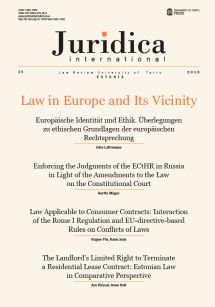Dear reader,
DOI:
https://doi.org/10.12697/JI.2016.24.00Abstract
The number of legal journals published in Estonia has always been limited. On the one hand, the reasons for such scarcity have always rested with the small population, which limits the size of the Estonian legal audience and thus the potential number of readers. On the other hand, the twists and turns of (recent) history have always meant interruptions in the publication of legal journals. Publishing two, three or even four journals at the same time has proven possible only in a very limited number of years. There is usually no reason to talk about decades in this context. All the more reason for us, as the publishers and authors of this journal, to be proud of the publication of yet another issue of our magazine. The first issue of Juridica International – the foreign language companion to the Estonian language journal Juridica, which has been published since 1993 – appeared twenty years ago, in 1996. Professor Paul Varul, Editor-in-Chief of Juridica International from 1996–2015, took a look back at these first twenty years in the editor’s column of our last issue. Juridica International has acted like a seismograph when it comes to reflecting reforms in Estonian law and legal education. When Estonia joined the European Union in 2004, new and significantly more international challenges alreadly came along during the preparatory stage, not to mention the subsequent active participation in the harmonisation processes of European Union law. The foreign language journal, published at and with the means of the Faculty of Law of Estonia’s own national university, the University of Tartu, has given our legal practitioners a chance to express their views among an international community of scholars in a highly visible manner. Juridica International has also played an important part in publishing materials from legal conferences and seminars held in Estonia. Juridica International has become an attractive international journal that reaches well beyond the borders of Estonia and the European Union. This widespread circulation has been assisted by free access online – a decision made by Juridica International years before “open access” became a keyword of global research policy.
In the span of only a couple of decades, the journal that first started as the “calling card” of the Faculty of Law at the University of Tartu, mainly introducing and analysing Estonia’s own legal developments, has become an internationally open, peer-reviewed legal journal that is represented in the most acknowledged databases. Since Juridica International is a universal legal journal by its very essence, and this number is not a topically focused conference issue, the geography of both the authors and the topics covered reflect points of interest and concern in the legal science of our region. A special place is reserved for the principal foundations of the European Union and European legal culture in general, and the latest developments in the law of Europe, Estonia, and other countries are addressed as always. One of the obvious causes for concern is Russia’s legal concept, and the legal situation of both it and its neighbours deserves an observant analysis.
As the new Editor-in-Chief of the journal, I thank all the editors, colleagues at the editorial board, and the technical team for their continued energy and hard work. For our readers, as well as current and future authors, I hope this issue will be thought-provoking, give you topics to reflect on, and a reason to join us time and again.


